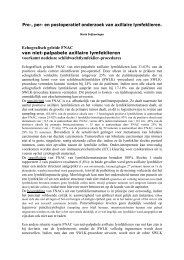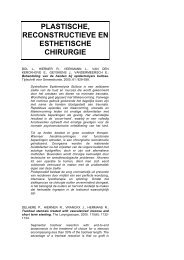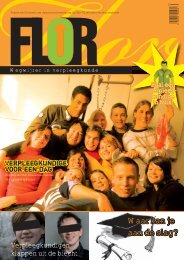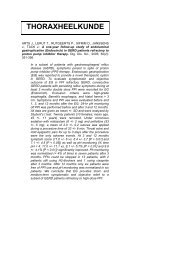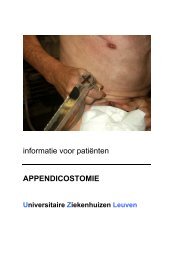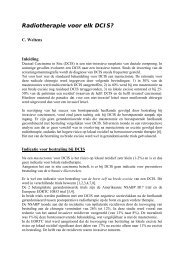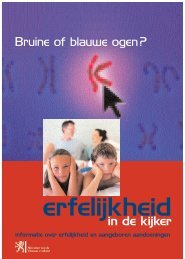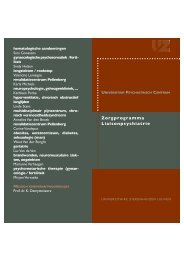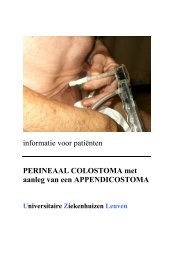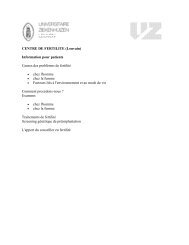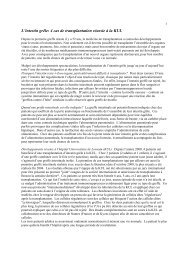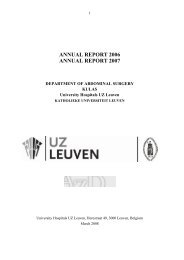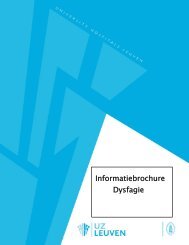JONIAU S., VAN BAELEN A., HSU C.Y., OYEN R., ROSKAMS T., VANPOPPEL H.: Treatment of clinical stage T3 prostate cancer: a surgicaldisease?. Eur. Urol. Suppl., <strong>2006</strong>; 5(2): 213 (761).Introduction & Objectives: The value of surgery as monotherapy inclinical stage T3 prostate cancer (cT3 PCa) is still subject to debate.The aim of this study was to examine the technical feasibility of radicalprostatectomy for cT3 PCa.Material & Methods: We reviewed the records of 139 patients whounderwent a radical retropubic prostatectomy (RRP) with pelviclymphadenectomy for cT3 PCa from January 1997 to December 2003.The files were critically reviewed and all data related to surgical andperi-operative complications were collected. Additionally, continenceand erectile function were assessed at 12 months postoperatively.Data were compared to series of RRP in patients with clinicallylocalised disease.Results: There was no peri-operative mortality. No ureteral or largevessel injury occurred. Rectal injury and injury of the obturator nerveoccurred both in 0.7% of cases. No serious in-hospital complicationswere noted and no reintervention was needed. Lymphorrhea wasnoted in 2,2% of patients and 1,4% experienced prolonged drainageof urine. In 7.2%, wound related problems occurred. Anastomoticstricture occurred in 2,9%. At 12 months, complete continence was87,8%. Erectile function fully recovered in 6% of patients whounderwent a non-nerve-sparing procedure and in 10% of patients whounderwent a unilateral nerve-sparing procedure. Positive surgicalmargin rate was only 13,7%.Conclusions: In cT3 PCa, RRP is technically feasible with morbiditycomparable to RRP in clinically localised PCa. Prospectiverandomised trials are needed to clearly define the place of surgery inthe treatment of cT3 PCa.JONIAU S., VANDER EECKT K., VAN POPPEL H.: The indications forpartial nephrectomy in the treatment of renal cell carcinoma. NatureClin. Practice Urol., <strong>2006</strong>; 3(4): 198-205.Partial nephrectomy is performed more frequently for small,incidentally discovered, low-stage renal tumors. Importantly, oneshould distinguish the imperative indications for such surgery from therelative and elective indications, while taking contraindications tonephron-sparing surgery into account. The main advantage of partialnephrectomy over radical nephrectomy is the avoidance of renalinsufficiency; the major disadvantages include the possibility of localrecurrence and perioperative complications. In this article, the144
literature on nephron-sparing surgery was reviewed in order to put themanagement of renal cancer into a modern perspective.JONIAU S., VAN POPPEL H.: Nephron-sparing surgery: experience in159 consecutive cases. Eur. Urol. Suppl., <strong>2006</strong>; 5(2): 182 (640).Introduction & Objectives: As a result of the widespread use ofultrasound, CAT scan and MRI, the majority of Renal Cell Cancer(RCC) is nowadays detected at an early stage. Nephron springsurgery has become an accepted treatment for small RCC. We reviewour experience in nephron sparing surgery for T1 and T2 lesions overthe last 5 years. The aim is to evaluate the feasibility and the safety ofthe technique and to assess oncological control.Material & Methods: Between July 1998 and July 2003, 159consecutive patients underwent nephron sparing surgery for T1 andT2 lesions at our institution. Mean age was 59 (2-82) years, meantumour volume was 4 (1-11) cm, mean follow-up 32 (5-65) months.Clinical stage was T1a in 77n4%, T1b in 19,5% and T2 3,1%. 69%had a normal contralateral kidney, 23% a solitary kidney and 8% hadbilateral tumours. Mean operating time was 91 minutes, 23% a solitarykidney and 8% had bilateral tumours. Mean operating time was 91minutes, mean blood loss 342 ml. Clamping was performed in 32,7%with a mean duration of 15 minutes. In 5% renal cooling wasperformed. There was an endorenal growth in 10,7%, a combinedgrowth in 43,4%, and an exorenal growth in 45,9%. Resection wasperformed in 30,2%, enucleoresection in 49,7% and enucleation in20,1%.Results: At histopathology, RCC was found in 76,7% and 23,3% werebenign lesions. Cancer free survival was 98,1%. Local tumourrecurrence occurred in 1,3% and metastasis in 0,6%. Intra-operativecomplications were seen in 2 patients (1,2%). In one patient, asplenectomy was necessary for bleeding and in another patient, aradical nephrectomy was done for arterial bleeding.In 15,1%, an early (< 1 month) postoperative complication occurred: apostoperative haematoma was found in 5,7%, acute renal failure in1,9%, wound problems in 1,3% and hematuria and urine leakage in 1patient (0,6%). 5 patients (3,9%) developed pneumonia and 3 patientshad cardiac problems. Late (> 1 month) postoperative complicationsoccurred in 6,3%. Chronic renal failure occurred in 2,5% andwoundherniation in 1,9%. One patient developed an arterial-venousfistula for which a super selective embolisation was performed. Localrecurrence occurred in two patients (1,3%). One patient had arecurrence at the resection site, another patient had a kidneyrecurrence.145
- Page 1:
CYRURGIE2006
- Page 4 and 5:
Heelmeesters allerhande, verenig u!
- Page 7:
INHOUDSOPGAVEAbdominale Heelkunde 1
- Page 10 and 11:
De resultaten van een grote Noord-A
- Page 12 and 13:
VEGF (P = 0.008) correlate with a p
- Page 14 and 15:
severe ulcerative ileitis and jejun
- Page 16 and 17:
tekens op CT en/of MRI kunnen een b
- Page 18 and 19:
data we propose a scoring system in
- Page 20 and 21:
ABDOMINALETRANSPLANTATIECHIRURGIECA
- Page 22 and 23:
DYCKMANS K., LERUT E., GILLARD P.,
- Page 24 and 25:
LERUT J., ORLANDO G., ADAM R., SABB
- Page 26 and 27:
histopathologic diagnostic process.
- Page 28 and 29:
additional stimulants that the inna
- Page 30 and 31:
ARTIKELS UIT HETLEUVENSE NETCREVITS
- Page 32 and 33:
PRUYT M., DEVRIENDT D., VANNESTE A.
- Page 34 and 35:
BOSHOFF D., BUDTS W., MERTENS L., E
- Page 36 and 37:
FLAMENG W., MEURIS B., HERIJGERS P.
- Page 38 and 39:
prosthetic valve endocarditis who w
- Page 40 and 41:
in these patients We present a case
- Page 42 and 43:
SERCA2a. In SKO mice, gene-targeted
- Page 44 and 45:
MULTIDISCIPLINAIRBORSTCENTRUMMORALE
- Page 46 and 47:
east implant. Only two other cases
- Page 48 and 49:
Object: Based on data from primate
- Page 50 and 51:
SISCOM hyperperfusion cluster and M
- Page 52 and 53:
ONCOLOGISCHEHEELKUNDEBROUNS F., SCH
- Page 54 and 55:
infiltrative multilobular spindle c
- Page 56 and 57:
multivariable Cox model adjusted fo
- Page 58 and 59:
We retrospectively evaluated a surg
- Page 60 and 61:
We performed resection arthroplasty
- Page 62 and 63:
earing posterior-stabilised. To do
- Page 64 and 65:
age and key pinch strength. The dif
- Page 66 and 67:
FABRY K., LAMMENS J., DELHEY P., ST
- Page 68 and 69:
cases. The mean Knee Society’s kn
- Page 70 and 71:
short-term solution for his fractur
- Page 72 and 73:
the foot and result in major septic
- Page 75 and 76:
SAEGEMAN V., LISMONT D., VERDUYCKT
- Page 77 and 78:
Objective: The objective of this st
- Page 79 and 80:
VICTOR J., BELLEMANS J.: Physiologi
- Page 81 and 82:
skin construct displays authentic f
- Page 83 and 84:
Bewertung des Spenderdefektes ergab
- Page 85 and 86:
HIERNER R., BERGER A.: Options and
- Page 87 and 88:
vascularized ulnar nerve graft and
- Page 89 and 90:
cranial bone and dura which cannot
- Page 91 and 92:
defects.Adequate debridement, early
- Page 93 and 94:
Patients and Methods: Between 1995
- Page 95 and 96:
MASSAGE P., VANDENHOF B., VRANCKX J
- Page 97 and 98:
Background: High pressure injuries
- Page 99 and 100:
VERMEULEN P., DICKENS S., VRANCKX J
- Page 101 and 102: inhibitors that neutralize the impa
- Page 103 and 104: internship. These components repres
- Page 105 and 106: Objective: To evaluate the expressi
- Page 107 and 108: patients were diagnosed with acute
- Page 109 and 110: Conclusions: This study demonstrate
- Page 111 and 112: progressive accumulation of FVIII a
- Page 113 and 114: his name to this condition through
- Page 115 and 116: gevallen, beschouwen wij de minimaa
- Page 117 and 118: Table 1Reperfusion time(min)PVR(dyn
- Page 119 and 120: transplantation; dehiscence (n = 25
- Page 121 and 122: upon reperfusion results from a red
- Page 123 and 124: VAN DE WAUWER C., VAN RAEMDONCK D.E
- Page 125 and 126: Bronchiolitis obliterans syndrome (
- Page 127 and 128: noodzakelijk een beter inzicht te v
- Page 129 and 130: patients of 70 years and older trea
- Page 131 and 132: of debate. A good pain relief can b
- Page 133 and 134: VAN GESTEL L., NIJS S., BROOS P.: T
- Page 135 and 136: UROLOGIEALBERSEN M., JONIAU S., VAN
- Page 137 and 138: children achieve bladder and bowel
- Page 139 and 140: Results: Ninety-five percent of the
- Page 141 and 142: esistant to degradation, but at 365
- Page 143 and 144: Results: Although the surgery was m
- Page 145 and 146: DE RIDDER D.: Conservatieve aanpak
- Page 147 and 148: pressures were measured. The effect
- Page 149 and 150: GOEMAN L., JONIAU S., OYEN R., VAN
- Page 151: pelvic lymph node status were not w
- Page 155 and 156: on overall survival was studied. Su
- Page 157 and 158: materials, although it was architec
- Page 159 and 160: Material und Methoden: Von 13 Zentr
- Page 161 and 162: a remarkable higher number of forei
- Page 163 and 164: VAN CALSTEREN K., VAN MENSEL K., JO
- Page 165 and 166: VANDE WALLE J.G.J., BOGAERT G.A., M
- Page 167 and 168: Introduction & Objectives: Control
- Page 169 and 170: VAATHEELKUNDEBLADT O., MALEUX G., H
- Page 171 and 172: FOURNEAU I., SABBE T., DAENENS K.,
- Page 173 and 174: computed tomography (CT) and magnet
- Page 175 and 176: We report an unusual case of a uret
- Page 177: during GPIb stimulation, its activa



